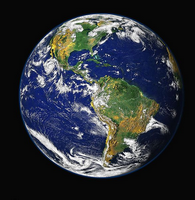Despite my reputation as a fierce defender of globalization's many benefits, I have always been of two minds on the human desire for connectivity in all its recently emergent possibilities. After all, my narrative on globalization began as the "Pentagon's New Map" -- not Google's or Goldman's. Even there, I was never under the impression that connectivity was an instant fix regarding human conflict -- quite the reverse. And I knew instinctively that the primary motive for increased connectivity throughout history has been individual greed for resources, opportunities, influence and -- most importantly -- an improved standard of living.
I've routinely expressed that ambivalence through two simple rules.
First, connectivity drives code -- i.e., rules in all forms. That in turn circumscribes behavior, which in turn is increasingly characterized by peace, stability, and -- crucially for the spread of commerce -- predictability. If you want to be the freest guy in the world (e.g., the Unabomber, Osama bin Laden, or an off-the-grid organic farmer), then disconnect yourself from everything, live in your shack in the woods or cave in the mountains, and pursue your agenda -- violent or otherwise. But if you want to connect, every connection comes with accompanying code. And the more connections you engage, the more you enmesh yourself in the rules that govern interacting with others.

